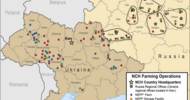Asian Tribune | Mon, 2009-12-07
By Farzana Shah
Government of Pakistan has announced to lease lands to foreign entities for corporate farming under the CAF policy. Government is hoping to get notable amount of revenue and job employment through this policy. Other than that government is also hoping to bring in new technology and best business practices for agriculture in Pakistan in order to boost this crucial sector.
Critics of this policy are apposing this due to various reasons and concerns. Pool of critics includes farmer associations, human right activists, analysts, food experts and columnists who are of the view that this policy holds more bane than bone.
This paper examines the CAF policy, Corporate farming worldwide and concludes that current CAF policy adopted for leasing land is not in best interest of Pakistan in context of food, water and land security.
In the end paper also contains some policy recommendations and suggestions for corporate farming to make it more beneficial for local farmers and communities alike.
Background
Government of Pakistan has decided to lease or sell at least 1.2 million acres of its fertile lands to two Gulf countries i.e. UAE and Saudi Arabia for corporate farming in order to fulfill the needs of these two countries. No contract with Saudi Arabia has been signed yet whereas according to reports an agreement with a company of UAE has been reached.
Corporate farming is a term that describes the business of agriculture, specifically, agriculture methodologies of multinational corporations (MNCs) involved in food production on a very large scale. Corporate farming is not limited to leasing farm only but also encompasses entire life cycle of a crop in that farm this includes seed supply, agrichemicals, food processing, machinery, storage, transport, distribution, marketing, advertising, and retail sales. [1]
But this is not limited to this far, corporations involved in corporate farming influence on education, research and public policy, through their educational funding and government lobbying efforts as well.
According to an estimate about 50 million acre of land have been bought or leased by foreign countries, MNCs or investors abroad. African countries are top of the list
Like any other business this kind of agriculture business has pros and cons for local people and foreign consumers alike. Practices and technology adopted in this kind of farming enhances the crops growth many times. This enhanced growth provides copious supply of food to foreign consumers but foster the idea to manipulation of resources like food, water and land for local community and farmers.
Current news regarding corporate farming in Pakistan has ignited a new debate about these pros and cons of the decision by government. Most of the analysts believe that CAF has a potential in country and also can enhance the growth of crops but that is only bright side of picture. Government CAF policy (discussed below) has paint a very bleak other side of picture. Due to current CAF policy adopted by Islamabad many of the farmers, agriculture businessmen, experts and analysts are not inline with government’s view about corporate farming.
Despite serious concern of farmers’ community and civil society, previous government approved Corporate Agriculture Farming (CAF) policy, while present government push the policy step ahead and announced to offer six million acre land to resourceful countries and Multinational Companies (MNCs).
Introduction to Corporate Farming Policy
According to ministry of investment the federal government through CAF policy is trying to achieve the followings;
1. To seek efficiency of production and increased incomes/revenues by bringing together agricultural production, processing and marketing activities at one place under the management of a corporate entity.
2. To improve agricultural productivity and profitability through the use of latest production technology and adequate expertise particularly for exports.
3. To produce high quality agricultural products due to favorable resource base.
4. To achieve/maintain internationally competitive unit cost of production for all major crops, fruits and vegetables
Government wants to meet these goals with following benefits being offered to investor or MNCs.
- 100% foreign equity allowed (only in CAF on case to case basis)
- Minimum $ 0.3 foreign equity investment
- Remittance of 100% capital, profits, dividends allowed
- Only such local and foreign companies will be entitled to Corporate Agriculture Farming that are incorporated in Pakistan under the Companies Ordinance, 1984.
- No upper ceiling on land holding. The size of the proposed corporate farm may be left to be determined by the prospective investor.
- State land can be purchased, or leased for 50 years through open auction, extendable for another 49 years
- All banks and financial institutions will earmark separate credit share for Corporate Agriculture Farming (CAF)
- Labor laws may not be presently applicable to Corporate Agriculture Companies. Due to special circumstances of the agriculture sector however appropriate labor laws be developed for this sector within five year.
- Agriculture Income Tax regime applicable in provinces, on income from agriculture, would be applicable to Corporate Agriculture Farming [2]
Fiscal Incentives for Corporate Agriculture Farming (CAF)
- 0% custom duty and sales tax on import of agricultural machinery, equipment
- and implements under SRO 575(I)/2006 dated 5th June, 2006
- Exemption of duty on transfer of land for CAF
- Tax relief; Initial depreciation allowance @ 50% of machinery cost.
- Dividends from corporate agriculture farms are not subject to tax
- Farm income given more favorable treatment than income from other sources
Potential Impact of the CAF Agreements
While implementing (Corporate Agriculture Farming) CAF policy, government must also keep in mind long term plans for agriculture development in Pakistan one such plan is Vision 2030.
According to CAF policy document, government is clearly deviating from its own long term plan set for 2030 in agriculture sector which states, “Comprehensive and wide ranging strategies have recently been initiated to mobilize small farmers. These include an intensive participatory outreach approach to make available key inputs such as credit, certified seed, training, small-farm equipment, veterinary coverage for livestock, milk collection, and establishment of a revolving fund for financing operations by the local communities through legally constituted Village Organizations (VOs). Such VOs will be the backbone of our agriculture production.
These will develop into corporate entities and a conduit for transfer of technology. Together with Farmer Field Schools (FFS), the VOs will help reduce the vast productivity gap between progressive farmers and resource poor small farmers.”[3]
This document clearly presents idea of enhancing the output of small farmers by establishing small organization and bringing it to the level of progressive or large scale farmers. Current CAF policy is a clear deviation from the route set for achieving agriculture targets in year 2030 when Pakistan will be a nation of more than 250 million people.
Apart from being contradictory to a long term plan this policy also contains many loopholes which would allow MNCs and local investors to manipulate whole food supply chain in Pakistan to pursue their own financial agenda. Below is brief description of these potential issues which can harm interests of Pakistani communities and farmers alike.
Impact on Local Farmers & Communities
According to policy ascribed above, there will be no limit to land holding for investor. This is the biggest concern for local farmers and communities. Government has failed to realize long term implications of this clause in CAF policy. It is inevitable that due to superior technology and practices corporate investor will able to get more yield per acre than local farmer and hence will be in position to sell this at cheaper price than goods cultivated by local farmers subsequently this will forced local farmer with small piece of land to sell its land to corporate investor as there is no limit for him to buy as much land as he wanted to.
This single concession offered to corporate farmer can annihilate whole agriculture sector of Pakistan. There is a great deal of concern in communities of farmers and agriculture experts that this will allow foreign investor to manipulate land resource by competition with local farmer in produced goods prices.
Million of families in Pakistan depend on agriculture and their cultivable land. Once gates opened for foreign investors and MNCs to grab as much land as possible using price manipulation of goods it will be very difficult for local farmers to find any ground to grow their crops and survive.
In presence of this clause investor can simply render local farmers landless by offering to much price to them but this will counter productive for these farmers and for Pakistan as these farmers will have no near by land to buy and cultivate neither they can come to cities and urban centers to start entrepreneurship in absence of any such skills. Communities and hence Pakistan will end up with more jobless people to feed.
Economics of Corporate Farming
Though it sounds really good how Pakistan would be beneficial economically from the corporate farming but again policy which will govern this business has lots of loopholes.
Money paid against lease or buying state land by investor will be one time gain by Pakistan, whereas investor will able to compensate itself against this money many times during lease from that land.
Pakistan will get few million dollars from this deal whereas investor is allowed to take 100% capital, profits, and dividends every year leaving nothing in Pakistani banks, hence not contributing a single penny in Pakistan’s foreign reserve assets.
Pakistan will shoot in the foot if it allows such liberalization of capital in times when economic situation is not stable and national economics are depended on IMF and other international donors.
On the other hand government is ensuring to give credit and other financial incentive to MNCs and more favorable treatment to income of these farms. Paksitani banks would be lending money to the MNCs without having any capital stay in these banks.
Apart from this all, there will be no tax on dividend (a sum of money paid to shareholders of a corporation out of earnings) from these farms meaning these farms will be exempted from tax net and would not contribute in increase in annual revenue collection of Pakistan.
Food Security Issues
According to policy document “Corporate Agriculture Farming (CAF)” investor would be allowed to take the entire produced crop without paying any tax on it whatsoever.
MNCs will decide what to grow and when to grow according to need of their own country or customers.
Internal food supply situation in Pakistan is getting dire by each year due to increase in population, decrease in available water and decrease in cultivable land around cities due to their expansion etc. According to recent report by UK based risk intelligence firm, Maplecroft, Pakistan is in the list of 15 countries where a severe food shortage has been forecasted in near future. In Food Security Risk Index of 148 countries Pakistan is at 11th position which are facing extreme to High risk of food shortages due to above mentioned reasons and other factors.
Competitively Bangladesh and India are at more secure position with respect to predicted food shortages ranking 20th and 25th position respectively in Food Security Risk Index. [4]
Beside the index report also stated “Food security is also affected by agricultural development, trade flows, foreign aid as well as government policies on nutrition,” Pakistan’s corporate agriculture farming policy would also push same trend of poverty in country as per many agriculture and food experts.
In presence of this bleak picture of food security of country in future it is beyond comprehension of many experts to lease or sell large amount of land to foreign investors overlooking domestic needs of future even if it is hilly or barren land because this barren land will require fresh water and that too in more quantity to bring required fertility in barren land. Like food security water availability and security is next big potential problem which this policy can spur.
Water security Issues
Pakistan already is facing a shortage of water for irrigation and daily consumption. Per capita water share is decreasing due to clumsy behavior of successive governments in this regard. Some time disputes over water between the provinces (particularly between Sindh and Punjab) are resolved by making compromises and concessions by one province to other. In presence of this grime situation of water availability how government will able to grantee water supply to these huge farmlands?
Water is a major reason behind the low yield in between the years in many districts. As Pakistani rivers depends upon climate very heavily and water availability keeps on vary within each season it will be very difficult to provide a constant amount of water to these corporate farms and if done it will deprive small farmer from water for their family farms.
National Security Issues
When established these huge corporate farm will also require protection and security around these farms. In CAF policy it is not clear that how government will ensure this security to MNCs and their farms keeping in mind current law and order situation in country particularly in NWFP and Baluchistan provinces where most of barren hilly government land is located.
Accordingly to some reports government will establish a security force of 100,000 personnel to protect these farms from any harm. It is not clear though how this security force will be paid for its services but reports suggests that government will pay to this force and a rough estimate of this payment is around 2 billion dollars every year.
But as it is stated in policy that there will be no upper ceiling to land holding for corporate farming there are chances when MNCs and investors demand more personnel for the security of their farms. Government has a limit to spend on such forces so eventually it will have to allow MNCs to bring in private guards and security firms.
Pakistani citizens and public officers are already facing security problems by the hands of some private firms in Pakistan hired by foreign forces. Current political and geo political situation don’t allow any foreign private force to stay in Pakistan. So an uncontrolled CAF policy can also lead to serious national security concerns as well.
If MNCs are allowed to bring in any private security force this will also pressurize Pakistan’s already under stressed law and order apparatus as it will have to have a check on these private security firms and their activities in Pakistan as well.
Legal Issues
Another aspect of CAF policy which undermines the rights of Pakistani workers is to exempt MNCs and investors from labor laws. This is something never adopted anywhere in the world.
The policy talks about development of proper labor laws for corporate agriculture farming. It is strange how come government announced a policy when no adequate legal framework is in place to regulate the employers and employees of corporate farms.
In absence of any legal framework for workers it will be all on jurisdictions of MNCs managements to settle issues of workers on the farms whichever way that suits them.
These are some of the concerns and issues which can turn government’s assurance of bringing food stability in country through corporate farming. Major weakness is not in corporate farming but is in the policy which has been laid down to bring investors and MNCs in Pakistan for this agriculture business.
Below are some of out suggestions in order to make the policy more cohesive according to needs and interests of Pakistani people in particular small farmers. Pakistan needs to secure its farmers and communities from any kind of intimidation by the hands of MNCs as it has happened in many countries in the world.
Policy Suggestions
One question that arises in case of Saudi Arabia and UAE is why to buy land and then establish farms and keep huge security guards for those farms? Saudi Arabia can easily buy produced corps like wheat, rice, vegetables and fruit from Pakistani farmers under an agreement in which these customers will bring in technology and will be allowed to take a stipulated portion of produced food items in return. This approach will also help Pakistan to incorporate new technologies of irrigation system, seed, farm management and food supply management into its own agriculture sector.
Pakistan and gulf countries can also sign bilateral deals to form corporate companies at public level to establish farms on barren lands with small farmers as shareholders to enhance the productivity and incorporating new technologies into Pakistan’s agriculture sector. In return these partners can have an assurance of supply of a certain amount of food items from Pakistan.
Revision of Policy
Current CAF policy requires serious overhauling to make it more inline with Pakistani interests. Agriculture land must not be treated as a commodity Sale to a foreign or local entity must be ban. Leasing must only allowed in the cases when small farmers are also share holders in these agreements and has given full protection by legal cover in form of laws.
One sided concessions to investors must also be revised and adjusted like separate share of capital for corporate farming in financial institutes. There are many other industries in Pakistan which require same kind of preferred financial treatment by banks and other financial institutes but never had one in past and unfortunately would have none in future.
Concessions like exemptions from labor laws and income tax will also have negative impact so must be revised as well. Government cannot allow foreign entities to make billion of dollars per year from Pakistan and not pay anything at all. CAF business must be brought in the tax net to increase annual revenue of country.
Most importantly any policy in agriculture sector must not contradict long terms plans for development of the nation like Vision2030 current policy is not completely inline with this long term plan hence must be revised.
Land Reforms
When our own 75 percent households are landless and poverty is rampant, why we are leasing land to rich Arab countries? While on the other hand India is grabbing land in African countries to meet its food security needs.
Best way to push for an agriculture based economy in Pakistan is to do land reforms which remained an unfinished agenda of many governments since last many decades. Land distribution in past has remained a mere political stunt by ruling parties in Islamabad. It is time to change this clumsy attitude and do land reforms on a fast pace.
Landless Pakistanis must get land from government to grow crops instead of selling or leasing this land. According to reports government is going to lease or sell 700,000 acres to UAE and 500,000 to Saudi Arabia now this is a total of 1.2 million acres of fertile cultivable land. Government can feed at least 120,000 families in rural Pakistan by providing 10 acres each from this land to in villages. This will cripple the poverty in rural areas to a great extend.
To prevent this program from political interference an associated program can also be launched to give ownership of these lands to farmers or landless families after a certain time period or after receiving a certain amount against allocated 10 acres. This will pave way for preventing subsequent governments to grab the lands back from these poor families and would also be helpful in raising their standards of living.
Education and Training Framers
One major reason behind low productivity in Pakistan has been long reliance on old methods of farming by farmers and this is due to the very low literacy rate among farmers in Pakistan particularly among small farmers.
Pakistani farmers are one of the most industrious workforces in the world but due to lack of know how about modern mechanized farming they are failed to achieve food sufficiency for the nation and competitiveness in the world market.
It is recommended that government launch training and education program for farmers giving small farmers priority to enhanced their productivity in the fields. Training about new irrigation techniques, high yield seeds, farm management are very critical at this point of time to keep Pakistan’s agriculture sector sustainable and productive enough to meet food supplies to the nation and for export as well.
Provision of New Agriculture Technology
According to the policy government has given incentive for MNCs to import machinery for corporate farming. This kind of incentive must be given to farmer communities at national level irrespective kind of farming the farmer is associated with; corporate or family.
Pakistani farmers are not incapable but only require government support in areas where small and medium scale farms cannot afford mechanized farming equipment.
Provision of Seed and Fertilizers
It is fact that during 1960s with improvement in irrigation system and government support Pakistani farmers were able to double the production of wheat, rice and enhanced cotton production 6 times to meet national demands there is no reason a our farmers cannot repeat same.
Only thing missing this time is commitment from government’s end who has absolutely no idea how to enhance the provision of necessary quality fertilizers and seed to whole farmer communities according to their soil and climatic conditions.
Comprehensive and integrated efforts are required to assess required amount and quality of necessary seed and fertilizers to the farmers. Pakistan has enhanced its fertilizer production over the years but still relay on imported fertilizers which some times lead to shortage of this crucial item in agriculture.
Protection for Small Farmer
While inviting MNCs and investor for corporate farming it is also crucial to provide protection to the assets of small farmers who earn their bread and butter from their small farms.
This is something very essential to protect social setup of large communities who depends on family farming totally. Government must ensure through legal means that no MNC will buy land from a small farmer against his will and nor will he threaten by other means to leave or sell his farm to MNC.
Financially small farmer cannot withstand challenges of corporate farming alone in market place as well. Government must also take this into consideration that prices offered by MNCs in market can be lower than those offered by small farmers. So a lower and upper limit of price for all items produced under CAF must be fixed to protect small farmers in local food market.
Keeping all above facts in mind it is evident that corporate farming is not a tool of increase local agriculture output in Pakistan by any means. International practices of corporate farming shows that it never paid any tangible benefit to local masses. Countries who lend their lands to MNCs are still facing severe or high risk of food shortages and decline in provision of resources like water to local communities (e.g Africa).
Local communities and citizen often deprived any benefits of corporate farming and there are multiple reasons for this like demands back in home, manipulation of local resources, influence of local supply chain of food etc. But manipulation and influence on food supply is only possible if local policy for corporate farming allow this to happen (unfortunately this is the exact case in Pakistan).
India is also growing in population like Pakistan but India has adopted to be in group of countries who lend land from other countries unlike Pakistan where own land is lend to others.
Government must take above mentioned issues and suggestions into consideration before concluding any deal for corporate farming. There is no doubt that Pakistan is in need of investment in agriculture in Pakistan but the policy which governs these investment must be inline with its national, economic, food, resource interests.
With growing population and declining food surplus worldwide every country is busy in securing food supplies for its masses. Pakistan currently facing a water shortage and is predicted to face food shortage in future as well. Pakistan must stick to its long term plans and must render all policies according to these long term plans. With rapid rate of growth in population it would very difficult for Pakistan to feed whole population when its own lands will be occupied by MNCs sending all eatable goods abroad or selling at high prices back to Pakistan.
References:
[1] Corporate Farming – Wikipedia, Free Encyclopedia:
http://www.wikipedia.com
[2] Corporate Agriculture Farming (CAF) Policy:
http://www.pakboi.gov.pk/pdf/Sectoral%20Policies/CAF%20-%20Policy%20Package.pdf
[3] Agriculture, Food, Water & Land Vision 2030:
http://www.pakboi.gov.pk/pdf/Agriculture,%20Food,%20Water%20&%20Land%20Vision%202030.pdf
[4] Maplecroft – Food Security Risk Index, 2009:
http://www.dawn.com/wps/wcm/connect/dawn-content-library/dawn/news/sci-tech/12-pakistan+at+extreme+food+security+risk--bi-07













